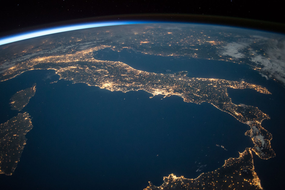THR's opinion
Space Tourism: Utopia or Fantasy?
 Space tourism is all the rage these days. In the past few months we’ve seen how large corporations have been infighting to be the first to send civilians to outer space, occupying substantial real estate in news cycles.
Space tourism is all the rage these days. In the past few months we’ve seen how large corporations have been infighting to be the first to send civilians to outer space, occupying substantial real estate in news cycles.
As a niche sector in aviation, space tourism’s principal competitive advantage is the delight of giving tourists the opportunity to convert, if temporarily, into astronauts and experience space travel as recreation or even for business means.
But space tourism doesn’t consist simply of sending civilians to space, given that there are a multitude of related activities in the sector, each with its own particular value proposition. Here a brief listing of the already-available options:
- High altitude flights – heights of nearly 20km are reached in a modified space shuttle, allowing passengers to see the curvature of the earth
- Zero-gravity flights – offering the experience of zero gravity through a series of maneuvers in a spaceship specially designed for the experience
- Sub-orbital flights – flights that “leave” earth’s atmosphere, but don’t reach orbit. These flights allow for passengers to have the feeling of being an astronaut during a short period of time
- Fully orbital flights – flights of longer duration that orbit around the Earth.
The THR team has analyzed these different typologies of tourism from different points of view given that the entire sector has an edge of novelty to it and clear future potential, and we’ve discussed a series of key factors that we believe worthy of highlighting.
Positive elements:
- An emerging market for a new typology of tourist: in the 21st century tourists no longer seek to travel just from one place to another. The search for original experiences and authenticity are now priority impulses, ergo space tourism presents ideal opportunities to satisfy those two needs.
- Increase in economic activity: despite the fact that – for now – space flight has elevated costs and is therefore only available for a chosen few, space tourism could well convert into a sector that generates a large number of tourism-related jobs and economic benefits.
- Scientific advances and benefits: the fact that “normalizing” space voyages would encourage an increase in attention and study to the field, thereby improving processes and technologies that until now were only studied by a relative few and with great haste in the race to space. As these activities and related research gain traction and awareness there will be consequent increased financing to support the cost of innovation.
Factors against:
- Highly elevated pricing: as such an innovative activity, and with the current fixed and variable costs of the associated technology, prices to go to space are extremely elevated. It’s reasonable to assume that in the future as costs decrease and more players enter the market, passenger prices will reduce, especially given anticipated future technology improvements. This will subsequently lead to increased demand across a more diverse set of segments.
- Viability of the business model: in its current iteration the sector does not appear to be a profitable model given the high costs and relatively limited demand.
- Sustainability: absent longitudinal studies on the emissions generated by each class of space tourism activity, it is difficult to calculate the overall environmental impact. That said, given the increasing concern for the environment and related climate change in the current zeitgeist, it should be a worrying factor in the long-term viability of space tourism at least until newer, less-polluting technologies are introduced.
- Regulation: the absence of government regulation and security protocols could relegate space tourism to a comparatively dangerous activity as the sector expands. In their enthusiasm and urgency to quickly bring products to market, promoters of space tourism may skirt security best practices in some cases.
In sum:
Currently, all related to space tourism is bathed in a certain wonder and at the same time an aura of scepticism. We can only conjecture about the future, though human nature will always lead us to discover new horizons.
When the first automobile was built more than 100 years ago, the debate as well centered around whether the product would be only applicable to the rich and eccentric. So the question posed, then, is 100 years from now, what will space tourism mean for us?